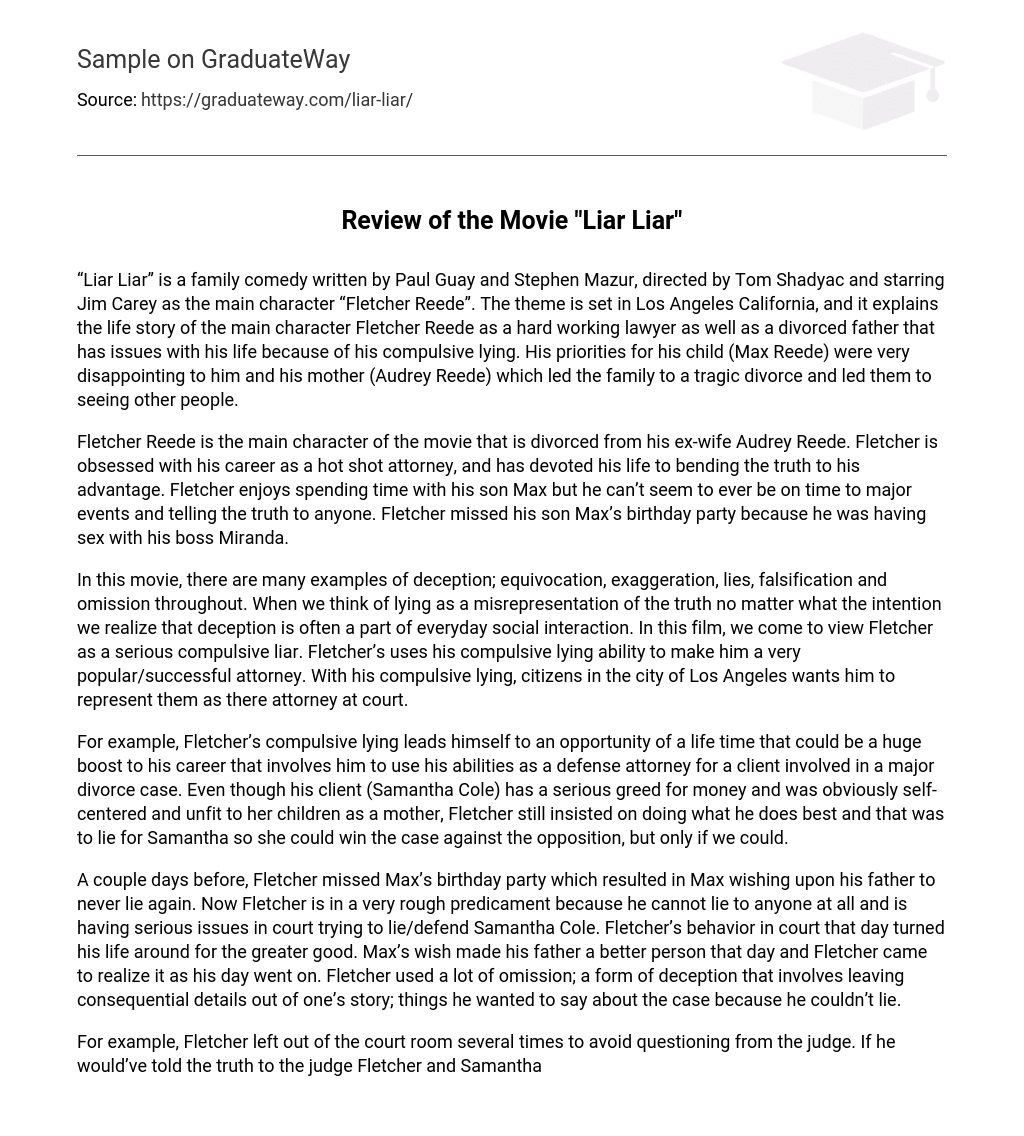“Liar Liar” is a comedic film that follows the life of Fletcher Reede, a dedicated lawyer and father who has gone through a divorce. Portrayed by Jim Carey, Fletcher resides in Los Angeles, California, where he grapples with his habit of compulsive lying and how it affects him. The movie delves into Fletcher’s challenging dynamic with his son Max and ex-wife Audrey, which ultimately leads to their unfortunate divorce and search for new relationships.
Fletcher Reede, the main character in the movie, is no longer married to Audrey Reede. A highly successful lawyer, Fletcher prioritizes his career and distorts the truth for his own benefit. Although he cherishes spending time with his son Max, Fletcher has difficulties being on time and telling the truth. Sadly, he even skipped Max’s birthday celebration because he was involved in a sexual encounter with his boss Miranda.
Throughout this movie, there are numerous instances of deceit, including equivocation, exaggeration, lies, falsification, and omission. When considering lying as a distortion of the truth regardless of intention, it becomes clear that deception is a regular occurrence in daily social interactions. In the film, Fletcher is portrayed as a highly skilled and persistent liar. He effectively utilizes his compulsive lying talent to become a popular and successful attorney. Due to his reputation, the people of Los Angeles specifically seek him out to represent them as their attorney in court.
For instance, Fletcher’s continuous lying presents him with an extraordinary chance that could greatly advance his career. This opportunity requires him to utilize his skills as a defense attorney in a significant divorce case. Despite Samantha Cole, his client, being excessively driven by money and clearly unsuitable as a mother for her children, Fletcher stubbornly insisted on employing his expertise in deceit to secure a victory for Samantha against the opposing party. However, this was contingent on certain conditions being met.
A few days earlier, Fletcher was absent from Max’s birthday celebration, causing Max to make a wish for his father to become incapable of lying. Now, Fletcher finds himself in a difficult situation as he is unable to tell lies, which poses serious challenges in court while trying to defend Samantha Cole. Fletcher’s conduct during the court proceedings transformed his life for the better. Max’s wish resulted in the improvement of his father’s character on that particular day, which slowly became apparent to Fletcher. In an attempt to navigate this predicament, Fletcher relied heavily on omission as a means of deception, selectively leaving out significant details about the case that he wanted to disclose but couldn’t due to his inability to lie.
For instance, Fletcher frequently exited the court room to evade questioning by the judge. If he had been honest with the judge, Fletcher and Samantha would have been unsuccessful in their case. Throughout the movie, Fletcher engaged in exaggeration, a deceitful tactic that involves magnifying or overstating facts. He also employed equivocation, which entails providing vague or ambiguous responses to create the illusion of having answered a question, as he was unable to tell lies.
Fletcher made several attempts to delay the case, such as hurting himself and giving excuses to the judge. However, he couldn’t bring himself to lie, so the case was not dismissed but only postponed. Later, when questioned about the person who assaulted him, Fletcher chose honesty and confessed that he had done it to himself. Ironically, Fletcher had no problem lying in the past, but he became angry at Samantha, his client, for exaggerating and falsifying her age. This made him realize that Samantha had lied, thus invalidating her signature on the prenuptial agreement.
This passage describes acts of dissimulation, which involve deceiving others by omitting crucial details that would alter the narrative. Audrey, the narrator’s ex-wife, is astonished by how much he has changed. She no longer believes his promises or statements. However, their son Max insists that his father is incapable of lying because he made a wish on his birthday for his dad to always be truthful. Audrey plans to leave Fletcher behind in Boston to escape his constant disappointments and lies and start afresh with their son.
Fletcher recognized a change within himself and was determined to demonstrate this transformation to Audrey and Max. Consequently, Fletcher caught up with Audrey and Max, persuading them not to proceed with their trip to Boston and granting him another opportunity to be a father. Whether or not lying is acceptable depends on one’s profession. In the realm of criminal justice, it is common for individuals to be trained to use deception. Attorneys often resort to exaggeration and falsehoods in order to secure favorable outcomes for their cases and receive higher compensation.





